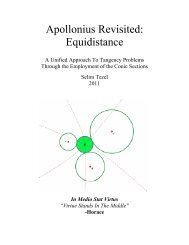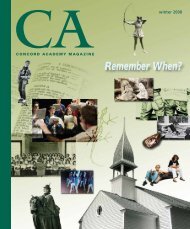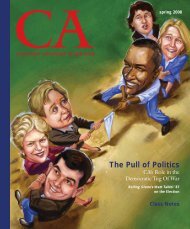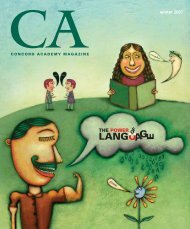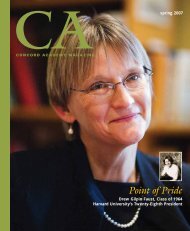CAMPUS
Meet Rick Hardy - Concord Academy
Meet Rick Hardy - Concord Academy
You also want an ePaper? Increase the reach of your titles
YUMPU automatically turns print PDFs into web optimized ePapers that Google loves.
John LaurenceClass of 1992Will PrinkletonThe Artof the Video GameIn his early teens, John Laurence ’92 began developing two compellingand seemingly disparate passions: Chinese culture and, thanksto CA teacher Bill Adams, computer science. He didn’t imagine he’dultimately fuse the two into a single career.But today, Laurence is the director of video game developmentat Sony Online’s Taiwan studio, based in Taipei. He has worked oncomputer and video games—like the hit game Everquest — andconcocts concepts to capture current and future generations of onlinegamers. “We make role-playing games that people from all over theworld can play online together,” Laurence explained. “Players take onroles like warrior, musician, or wizard as they enter a virtual fantasyworld to fight monsters.”The games are popular in the U.S., but even more so in Asia,which Laurence attributes in part to the culture. “In many parts of Asia,houses are very small. Whereas teens in the U.S. might invite kidsover, in China it’s unusual for young people to bring friends home,”he said. “Instead, they meet online or at Internet cafes and playcomputer games.”Laurence currently is designing a game based on the movie KungFu Hustle, produced by Sony Pictures Entertainment four years ago,when it was still affiliated with Sony Online. “For this game, we used atechnique called ‘motion capture’ to replicate a lot of the moves,” hesaid. “We put sensors on the bodies of the actors to capture theirmoves in 3D. I got to work with actors, choreographers, and stuntmenfrom movies including Kill Bill, The Matrix, and Crouching Tiger, HiddenDragon.” The game Kung Fu Hustle has just been released in Asia andis expected to be available in the U.S. later this year.Although he directs a staff of more than forty, Laurence describeshimself as hands-on. “When it comes to the initial narrative [of ourgames], we work with scriptwriters from the Hong Kong film industry,”he said. “But as far as working out the plot of the game—developingscenarios, the background of characters, how they interact with oneanother—I love being involved in that.”Though Laurence grew up in Chicago, he said Taipei now feels likehome. He finds life on the island of Taiwan “a melting pot of influences”from China, nearby Japan, and the West. “Every day I learn somethingnew,” he said. “Working in a different culture with a different languagegives me a chance to constantly see things from a new perspective.As a foreigner, I’m able to take a lot of those references and put theminto our games.”“I’d like to see gaming become . . .a form of artistic expression.”Laurence believes interest in video gaming will continue to grow inthe U.S. “In the past, it had been something of a niche activity, kind of ageeky thing,” he said. “I’d like to see gaming become a bigger part ofpopular culture, something people look at as a form of artisticexpression.” Just as the film world has mainstream releases as well asarthouse films to appeal to a more eclectic crowd, Laurence would liketo see video gamers experiment with various genres.In the meantime, he expects that electronics companies, such asthe one that spawned Sony Online, will improve technology to expandvisual possibilities for video games. “Right now we are limited [in gamedesign] by a flat screen,” he said. “In the future, I’m hoping forholographic displays that allow you to play in 3D.“Dreaming up things like that is the best part of my job: I get to becreative, cook up new ideas, and see them eventually come to light.”13W W W . C O N C O R D A C A D E M Y. O R G F A L L 2 0 0 9



